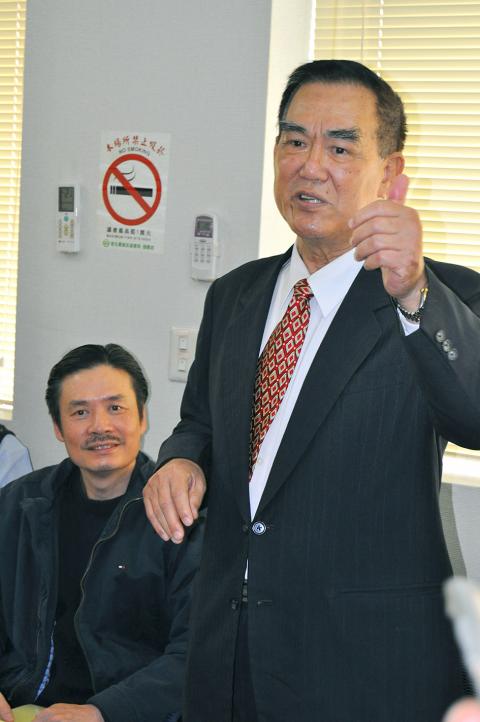Lin Hsien-pao (林仙保), the father of former Executive Yuan secretary-general Lin Yi-shih (林益世), passed away at the age of 72 yesterday morning from what doctors’ preliminary diagnosis indicated was heart trouble.
Legal experts said that Lin Hsien-pao’s death close to the date of the Taipei District Court’s ruling on his son’s graft case — scheduled for April 30 — would not have an impact on the ruling, as Lin Hsien-pao had been ruled out as a suspect. Lin Yi-shih, his wife, Peng Ai-chia (彭愛佳), his mother, Shen Ruo-lan (沈若蘭), and Shen’s elder and younger brothers have been charged with embezzlement and graft.
Prosecutors earlier this month requested a life sentence for Lin Yi-shih, who has been charged with corruption.

Photo: Su Fu-nan, Taipei Times
Lin Yi-shih has been accused of demanding bribes from Ti Yung Co owner Chen Chi-hsiang (陳啟祥) and pocketing about NT$60 million (US$2.02 million) in bribes, concealing illicit gains and having undeclared assets.
While Lin Hsien-pao’s voice was reportedly heard in a recording of a conversation between Lin Yi-shih and Chen, apparently negotiating a 2010 bribe to secure a metal recycling contract from state-controlled China Steel Corp, the Special Investigation Division ruled Lin Hsien-pao out of the case on the grounds that Lin Hsien-pao was hard of hearing and there was no other evidence implicating him.
In accordance with local traditions, the Lin family yesterday requested that Lin Hsien-pao’s body be returned home from hospital, and in the afternoon there were a growing number of relatives, friends and local political heavyweights calling at the Lin residence to pay their last respects.
Preliminary diagnoses pointed to heart issues, as Lin Hsien-pao had a history of diabetes and was on medication, doctors said.
Lin Hsien-pao was one of the most influential political figures in the Greater Kaohsiung area.
His political career spanned more than four decades and he served as a county councilor, provincial councilor and had been named a national policy adviser.
The former Kaohsiung county’s political scene is roughly divided into three different factions — the “Reds” and the “Whites,” which have their power bases in the county’s Farm Irrigation Association and Farmers’ Association respectively and are perceived to sympathize more with the pan-blue camp, and the “Blacks,” who are seen as more sympathetic to the pan-green camp.
Lin Hsien-pao was seen as a key figure in the Red Faction, and along with Legislative Speaker Wang Jin-pyng (王金平) of the White Faction, one of the leading local political heavyweights.

Trips for more than 100,000 international and domestic air travelers could be disrupted as China launches a military exercise around Taiwan today, Taiwan’s Civil Aviation Administration (CAA) said yesterday. The exercise could affect nearly 900 flights scheduled to enter the Taipei Flight Information Region (FIR) during the exercise window, it added. A notice issued by the Chinese Civil Aviation Administration showed there would be seven temporary zones around the Taiwan Strait which would be used for live-fire exercises, lasting from 8am to 6pm today. All aircraft are prohibited from entering during exercise, it says. Taipei FIR has 14 international air routes and

The Ministry of National Defense (MND) today released images of the military tracking China’s People's Liberation Army (PLA) movements during the latest round of Chinese drills around Taiwan. The PLA began "Justice Mission 2025" drills today, carrying out live-fire drills, simulated strikes on land and maritime targets, and exercises to blockade the nation's main ports. The exercises are to continue tomorrow, with the PLA announcing sea and air space restrictions for five zones around Taiwan for 10 hours starting from 8:30am. The ministry today released images showing a Chinese J-16 fighter jet tracked by a F-16V Block 20 jet and the

Snow fell on Yushan (Jade Mountain, 玉山) yesterday morning as a continental cold air mass sent temperatures below freezing on Taiwan’s tallest peak, the Central Weather Administration (CWA) said. Snowflakes were seen on Yushan’s north peak from 6:28am to 6:38am, but they did not fully cover the ground and no accumulation was recorded, the CWA said. As of 7:42am, the lowest temperature recorded across Taiwan was minus-5.5°C at Yushan’s Fengkou observatory and minus-4.7°C at the Yushan observatory, CWA data showed. On Hehuanshan (合歡山) in Nantou County, a low of 1.3°C was recorded at 6:39pm, when ice pellets fell at Songsyue Lodge (松雪樓), a

NO SHAME IN RETREAT: Hikers should consider turning back if the weather turns bad or if they do not have sufficient equipment, the Taroko park headquarters said Two people died of hypothermia over the weekend while hiking on Hsuehshan (雪山), prompting park authorities to remind hikers to bring proper equipment and consider their physical condition before setting out in the cold weather. Temperatures dropped over the weekend, bringing snow to high altitudes in Shei-pa National Park. One hiker, surnamed Lin (林), who on Friday was traveling with a group of six along the Hsuehshan west ridge trail, lost consciousness due to hypothermia and died, the Shei-pa National Park Headquarters said. On Saturday, another hiker, surnamed Tien (田), in a group of five on the southeast of the west